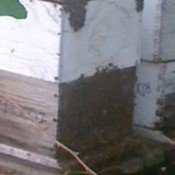 Most people think honey is honey, but not all honey is created equal. Store bought honey (store brand and name brand) most of the time is not all USA honey. A computer will print the place of origin of honey on the container. This can range from Korea to South America.
Most people think honey is honey, but not all honey is created equal. Store bought honey (store brand and name brand) most of the time is not all USA honey. A computer will print the place of origin of honey on the container. This can range from Korea to South America.
Also honey from big distributors has been heated up over 120 degrees F. This means that all the health benefits of the enzymes and pollen has been removed and denatured. Pure raw honey DOES NOT need to be pasteurized. Also big distributors will add or feed the bees high fructose corn syrup in order to get them to produce honey faster, creating lazy bees that don't pollinate as well.
Due to the lack of labeling regulations, producers don't have to put on the label that they feed the bees another sugar source, or that they mixed the honey in the facility. A trick to this is that honey in its true pure form, with no human help of added sugars, will last forever. If the honey has a best used by date, it is not 100% honey like the label says. It means that somewhere down the line, a sugar source was added.
If it's 100% honey in its natural raw state you want, please find a local beekeeper in your area. You might find true raw honey in a store, but I doubt it.
Don't be afraid to ask your local keeper if they feed the bees and where the bees are at in relation to your home. Honey within 40 miles of your home is the best for allergies!
Source:These are the most asked questions we receive about the differences in raw honey verses others with our bee farm.
By audi from Natchitoches, LA
Here are the questions asked by community members. Read on to see the answers provided by the ThriftyFun community.
I love buying fresh, local honey, but am wondering if I am spending too much for the product. Would you mind telling me the prices in your areas, just to get an idea of what the going rates are? Thanks.
By ms. carmen
We just bought 60 lbs. of clover honey for $100.00 from a local beekeeper. The honey came in 5# plastic bottles.
I buy honey from my friend's son and it is $5 for a pint.
A spoonful at night is wonderful at controlling allergies but you need to use fresh, local honey (bees are collecting the very stuff that is causing your allergies) and not the store bought kind that has had all of the good antibacterial properties cooked out of it.
A dear friend of mine who had cancer and could not take any kind of allergy medicines because of her treatments did this every day and swore by it. It just takes longer to work but is so much safer.
Look up honey online and you will be amazed at all of it's healing properties, besides just being delicious.
Sam's Club in Canton, OH, sells 5 lbs for $11.00. Regular stores in the area generally have only smaller containers and charge more per unit weight.
In northern CA, direct from the beekeeper, we buy it for $3, a pound. It is very good, and good for you.
Mix some with butter, and cinnamon for great toast or an English muffin.
I live in Iowa and around here we have the Sioux Bee Honey Plant. Honey runs anywhere from $3.00-$7.00 depending which kind you get. The better the quality the more you have to pay.
I'm from N.C. and ours is 5 a pint but mine is free my brother has bees and we have them at our garden have been bit 3 times walking in the yard they love clover.
I'd like to thank you all for your help. I have discovered buckwheat, sage, star thistle honies the past few years as well as the clover and wild flower. I have been having way too much fun buying these and even considered making my own for awhile.
I pay $8 for 4 pound jar of the clearest, lightest color of clover honey. It is locally captured within 10 miles, from the regional crops, which again, help with the allergy issue.
I have had buckwheat which was grown about 100 miles away, different taste so different use in my cooking/baking. The clover I can use in anything, and do. This is west central MN!
Kudos to Marsha Neely's Honey & Herbs Farm.
I am a local beekeeper. My answer: the value is priceless. If you are buying from a beekeeper, you are helping the bees. Most beekeepers don't profit from the sale of the honey, they just put their earnings into next year's hives. Bees are averaging about $100 per 3lbs here. I have at least $400 dollars in each hive. Last year, I got 0 honey for myself.
If you are purchasing from a local beekeeper, you are helping the crops and keeping the bees which are slowly dying from pesticides and diseases. Albert Einstein once said: If the bee disappears from the surface of the earth, man would have no more than four years to live. No more bees, no more pollination, no more men!
Something to think about.